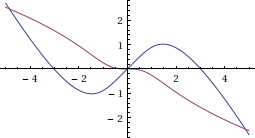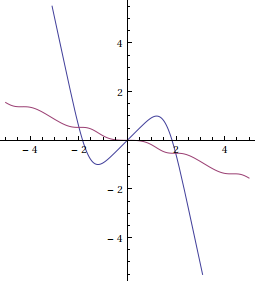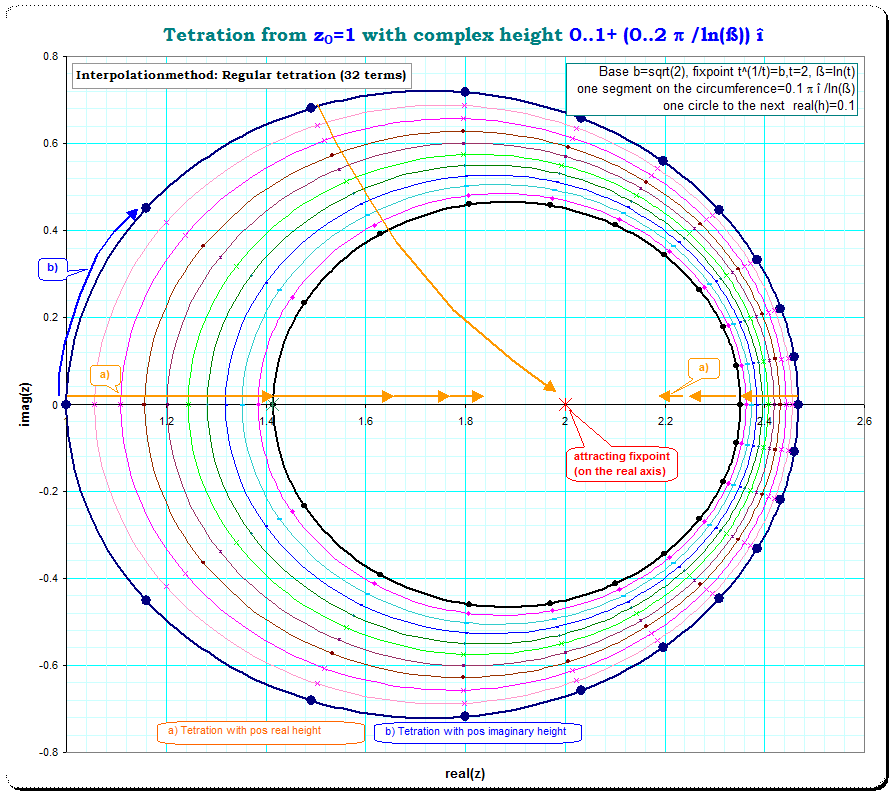John Milnor, in his book Complex Dynamics in One Variable, has Ernst Schröder at the top of a list of the founders of the field of complex dynamics, and in Schröder's investigations of special cases of functional iteration, or iterated functional composition (IFC), the iteration is reduced to translation of a basic flow function.
If you look at Schröder's 1869/1870 paper "Ueber unendlich viele Algorithmen zur Auflösung der Gleichungen", or the translation (which has a transcription error) by Stewart, "On infinitely many algorithms for solving equations", you'll see that Schröder made use of the iterated derivatives, or iterated infinitesimal generators (IGs), $(\frac{1}{f'(z)}\partial_z)^n=(g(z)\partial_z)^n $, in his exploration of IFC related to generalization of Newton's iterative method of finding zeros of an equation. For an analytic function $f$ and its local compositional inverse $f^{(-1)}$, Schröder constructs the series, in terms of the IGs, for $FL(z,t)=f^{(-1)}[t+f(z)]$ evaluated at $t = -f(z)$, giving the zero $z_1 =FL(z,-f(z))= f^{(-1)}(0)$ of $f(z)$. Although Schröder doesn't directly symbolically couch his analysis this way, equation 21 in Schröder's paper is a truncated series expansion for $FL(z,t) \; |_{t = -f(z)}$ as is clear by comparison with the compositional inversion partition polynomials of OEIS A134685. Alexander, on p. 10 in his book A History of Complex Dynamics, mentioned in the comments to the question, displays equation 21 of Schröder as equation 1.6. In discussing Schröder's later 1871 paper "Ueber iterite Functionen", Alexander displays $FL(z,t)=f^{(-1)}[t+f(z)]$ (mod notation) and its functional iterate on p. 14.
For IFC, Schröder's intuition is more or less as follows;
Given an analytic function $f(z)$ and its local inverse $f^{(-1)}(\omega)$, for $s$ and $t$ small enough in amplitude, the flow function
$$FL(z,t) = f^{(-1)}(f(z)+t)$$
satisfies the translation equation (see
$$FL(FL(z,s),t) = FL(z,s+t).$$
(See the Abel equation for relation to the Abel, Schröder, and Böttcher functional equations of iterated function theory.)
Consequently, the $n-$th IFC in $z$ of the flow function is
$$FL^{(( n ))}(z,t)=f^{(-1)}(f(z)+(n+1)t) = FL(z,(n+1)t) .$$
The obvious formal generalization for any complex number $\alpha$ is
$$FL^{(( \alpha ))}(z,t)=f^{(-1)}(f(z)+(\alpha+1) t)= FL(z,(\alpha+1) t) .$$
The analytic flow function $FL(z,t)$ may be generated by the Graves-Lie op as
$$e^{t g(z)\partial_z} \; z = f^{(-1)}(f(z)+t) =FL(z,t),$$
where $g(z) = \frac{1}{f'(z)} = \frac{1}{\partial_z f(z)}.$
In this case, one can regard a complex iterate as either translation (flow) in the complex plane or complex exponentiation of the op $e^{g(z)\partial_z}$.
The associated evolution p.d.e., coding the tangent vector to the field, is
$$\partial_t FL(z,t) = g(z)\partial_z FL(z,t),$$
and all the apparatus for dealing with flow fields can be brought to bear on the problem. (Links and notes on that in OEIS A145271 and A139605.)
The associated autonomous o.d.e. is
$$ \partial_z \;f^{(-1)}(z) = g(f^{(-1)}(z)),$$
which provides a link to the beta function of renormalization group
flow.
Some more refs:
"A survey of the theory of functional equations" by Kuczma, eqn. 111 on p. 35.
"A survey on the hypertranscendence of the solutions of the Schröder’s, Böttcher’s and Abel’s equations" by Gwladys Fernandes, eqn. 11 on p. 5.
“Variational aspects of the Abel and Schroeder functional equations” by McKiernan.
“Some differential equations related to iteration theory” by Azcel and Gronau.
Another logician, Frege, also considered the infinitesimal generator approach. See “Gottlob Frege, A Pioneer in Iteration” by Granau.
“Eri Jabotinsky, mathematician and politician: a short biography” by Gronau.
“Analytic iteration” by Jabotinsky.
“On analytic iteration” by Erdos and Jabotinsky.
(Added on 9/6/2022: For a flow function for real functions, "Note on the iterations of functions of one variable" by M. Ward and "The continuous iteration of real functions" by Ward and Fuller.)
Edit, Mar. 6, 2022:
Reading through Anixx's answer to the linked question, I realize I have not directly addressed a complex iterate in the way he has; however, there is a purely formal connection of my answer to his.
He considers the Newton-Gregory interpolation of the positive integer IFCs of a function. In my case that amounts purely formally to
$$\sum_{n = 0}^{\infty} (-1)^n \binom{\alpha}{n} \sum_{k=0}^n (-1)^k \binom{n}{k} FL(z,k)$$
$$ = \sum_{n = 0}^{\infty} (-1)^n \binom{\alpha}{n} \sum_{k=0}^n (-1)^k \binom{n}{k}e^{kg(z)\partial_z}\; z$$
$$ = (1-(1-e^{g(z)\partial_z})^{\alpha} \; z =e^{\alpha g(z)\partial_z} \; z = FL(z,\alpha). $$
This is also intimately related to the formal Mellin transform interpolation
$$\int_0^{\infty} \sum_{n \geq 0} (-1)^n FL(z,n) \frac{u^n}{n!} \frac{u^{s-1}}{{(s-1)}!} du $$
$$ = \int_0^{\infty} \sum_{n \geq 0} (-1)^n e^{ng(z)\partial_z} \frac{u^n}{n!} \frac{u^{s-1}}{{(s-1)}!} du \; z$$
$$ = \int_0^{\infty} e^{-ue^{g(z)\partial_z} } \frac{u^{s-1}}{{(s-1)}!} du \; z = (e^{g(z)\partial_z})^{-s} \; z = e^{-sg(z)\partial_z}z = FL(z,-s)$$
$$ = \int_0^{\infty} e^{-u} e^{(1-e^{g(z)\partial_z)} u} \frac{u^{s-1}}{{(s-1)}!} du \; z$$
$$ = \sum_{n\ge 0} \binom{n+s-1}{s-1}(1-e^{g(z)\partial_z})^n \; z$$
$$= \sum_{n= 0}^{\infty} (-1)^n\binom{-s}{n}\sum_{k=0}^n (-1)^k \binom{n}{k}e^{kg(z)\partial_z} \; z = e^{-sg(z)\partial_z}z .$$
Choosing $e^{-sg(z)\partial_z}z=FL(z,-s)$ for small amplitude/modulus $s$ and then analytically continuing to larger $|s|$ provides an interpretation, or summation method, for the formal maneuvers above.
Addressing the comment by Gottfried Helms:
As I've shown in numerous MO-Q&As, e.g., this MO_A, this one, and this one, for points $(\omega,z)$ for which $\omega = f(z)$ and $z = f^{(-1)}(\omega)$,
$$e^{t g(z) \partial_z} \; z = \exp[t \frac{\partial}{\partial f(z)}] \; z = \exp[t \frac{\partial}{\partial \omega}] \; f^{(-1)}(\omega) $$
$$ =f^{(-1)}(\omega+t) = f^{(-1)}(f(z)+t)= FL(z,t),$$
and we can see that this is equivalent to a Taylor series expansion, which is the approach Schroeder and, as he acknowledges, Theremin before him took. One has to be careful that $t$ is small enough that $\omega+t$ remains within the disc of analyticity about $\omega$.
Parse $t$ into $u+v=t$ for which $\omega+u$ and $\omega+u+v$ lie in the disc of analyticity of $f^{(-1)}$. Then
$$FL(z,t) = e^{t g(z) \partial_z} \; z = e^{vg(z) \partial_z} e^{ug(z) \partial_z}\; z$$
$$=\exp[v \frac{\partial}{\partial \omega}] \exp[u \frac{\partial}{\partial \omega}] \; f^{(-1)}(\omega) $$
$$=\exp[v \frac{\partial}{\partial \omega}] f^{(-1)}(\omega+u) =f^{(-1)}(\omega+u+v) $$
$$= f^{(-1)}(f(z)+u+v) = FL(z, u+v).$$
Reframing the intermediate steps,
$$FL(z,t) = e^{t g(z) \partial_z} \; z = e^{vg(z) \partial_z} e^{ug(z) \partial_z}\; z$$
$$=\exp[v \frac{\partial}{\partial \omega}] \exp[u \frac{\partial}{\partial \omega}] \; f^{(-1)}(\omega) $$
$$=\exp[v \frac{\partial}{\partial \omega}] f^{(-1)}(\omega+u)= e^{vg(z) \partial_z} f^{(-1)}(f(z)+u) =e^{vg(z) \partial_z} FL(z,u) $$
$$ =f^{(-1)}[f[f^{(-1)}(f(z)+v)]+u] = FL(f^{(-1)}(f(z)+v),u)= FL(FL(z,v),u) $$
$$= f^{(-1)}(f(z)+v+u) = FL(z, v+u).$$
For the substitution and reduction in the first equalities of the fourth and fifth lines, i.e.,
$f[f^{(-1)}(f(z)+v)] = f(z)+v = \omega +v,$
to be valid, either $\omega +v$ has to lie in the domain of $f^{(-1)}$ such that it remains the local inverse of $f$ or $f^{(-1)}$ as an analytic expression has to be analytically continued to the local inverse at that point.
An example:
For $m \neq 0$, with $\omega=\frac{z^{-m}}{m}=f(z)$ and $z=(m \cdot \omega)^{\frac{-1}{m}}=f^{(-1)}(\omega)$, the exponential mapping gives
$\exp[-t\cdot z^{m+1}\frac{\partial }{\partial z}] z=\exp[t\cdot \frac{\partial }{\partial \omega}](m \cdot \omega)^{\frac{-1}{m}}=(m \cdot (\omega+t))^{\frac{-1}{m}}=\frac{z}{(1+\ m \cdot t \cdot z^m)^{\frac{1}{m}}} =FL_m(z,t).$
Note upon direct substitution, $FL_{m}(FL_{m}(z,s),t)=FL_{m}(z,s+t)$ for any $s$ and $t$ for $|z|$ small enough regardless of the derivation of $FL_m(z,t)$. (This is satisfied in the limiting case for $m \to 0$ as well.)
Edit 3/10/22:
Consider the basic Möbius, or linear fractional, transformations:
1) Translation
With $f(z) = z$, then $f^{(-1)}(z)=z$, and
$$FL(z,t) = f^{(-1)}(f(z)+t) = z+t $$
with
$$FL(FL(z,s),t) = z+t \; |_{z \to z+s} = z+s+t = FL(z,s+t).$$
Self-composition in $z$ of $h(z) = FL(z,t)$ once gives
$$h^{((1))}(z) = h(h(z)) = FL(FL(z,t),t) = ((z+t) +t) = z+2t = FL(z,2t).$$
Then iterating $n=1,2,...$ times,
$$h^{((n))}(z) = FL(FL(FL(...,t),t),t) = ((z+t)+ t \cdots +t) = z +(n+1)t = FL(z,(n+1)t).$$
More generally for any complex $\alpha$, define the complex iterate as
$$h^{((\alpha))}(z) = FL(FL(z,\alpha t),t) = FL(z, (\alpha +1) t) = z + (\alpha +1) t.$$
From the perspective of the Lie IGs, consistently, $g(z)= 1/f'(z) = 1$, and, for $t$ any complex number,
$$e^{t g(z) \partial_z}\; z =e^{t \partial_z}\; z = z+t = f^{(-1)}(f(z)+t) = FL(z,t).$$
For $u$ and $v$ any complex numbers,
$$e^{v g(z) \partial_z} \; e^{u g(z) \partial_z}\; z =e^{v \partial_z}\; (z+u) = z+u+v = e^{v \partial_z}\; FL(z,u) = FL(FL(z,v),u) = FL(z,u+v).$$
2) Dilation
With $f(z) = \ln(z)$, then $f^{(-1)}(z) = e^z$, and
$$FL(z,t) = f^{(-1)}(f(z)+t) = e^{\ln(z)+t} = e^t\; z $$
with
$$FL(FL(z,s),t) = e^t z \; |_{z \to e^s z} = e^t e^s z = e^{t+s} z = FL(z,s+t).$$
Self-composition once of $h(z) = FL(z,t)$ gives
$$h^{((1))}(z) = h(h(z)) = FL(FL(z,t),t) = e^t (e^t z) = e^{2t} z = FL(z,t+t).$$
Then iterating $n=1,2,...$ times,
$$h^{((n))}(z) = e^t (e^t (...e^t z) = e^{(n+1)t} z =FL(FL(z,nt),t) =FL(z,(n+1)t).$$
More generally for any complex $\alpha$, define
$$h^{((\alpha))}(z) = FL(FL(z,\alpha t),t) = FL(z, (\alpha +1) t) = e^{(\alpha + 1)t}\; z.$$
Consistently, $g(z) = 1/f'(z) = z$, and
$$e^{tg(z)\partial_z} \; z = e^{tz\partial_z} \;z = \sum_{n\ge 0}\; \frac{t^n}{n!} (z\partial_z)^n \:z = e^t \; z = FL(z,t). $$
For $u$ and $v$ any complex numbers,
$$e^{v g(z) \partial_z} \; e^{u g(z) \partial_z}\; z =e^{v z\partial_z}\; e^u z = e^u e^v z = e^{u+v} z$$
$$ = e^{v \partial_z}\; FL(z,u) = FL(FL(z,v),u) = FL(z,u+v).$$
3) Special linear fractional transformation
With $f(z) = \frac{1}{z}$, then $f^{(-1)}(z) = \frac{1}{z}$, and
$$FL(z,t) = f^{(-1)}(f(z)+t) = \frac{1}{z} \; |_{z \to f(z)+t = \frac{1+tz}{z}} = \frac{z}{1+tz} $$
with
$$FL(FL(z,s),t) = \frac{z}{1+tz} \; |_{z \to \frac{z}{1+sz}} = \frac{z}{1+(s+t)z} = FL(z,s+t).$$
One functional self-composition of $h(z) = FL(z,t)$ gives
$$h^{((1))}(z) = h(h(z)) = FL(FL(z,t),t) = \frac{z}{1+(t+t)z} = FL(z,t+t).$$
Then iterating $n=1,2,...$ times,
$$h^{((n))}(z) = \frac{z}{1+(n+1)tz} =FL(FL(z,nt),t) =FL(z,(n+1)t).$$
More generally for any complex $\alpha$ define
$$h^{((\alpha))}(z) = FL(FL(z,\alpha t),t) = FL(z, (\alpha +1) t) = \frac{z}{1+(\alpha +1)tz}.$$
Consistently, $g(z) = 1/f'(z) = -z^2$, and, for $|tz| < 1$,
$$e^{tg(z)\partial_z} \; z = e^{-tz^2\partial_z} \;z = \sum_{n\ge 0}\; \frac{t^n}{n!} (-z^2\partial_z)^n \;z = \sum_{n\ge 0}\; (-tz)^n\; z = \frac{z}{1+tz} = FL(z,t). $$
With $\alpha= u+v$ for $u$ and $v$ any complex numbers, $|uz|<1$, and $|\frac{uz}{1+vz}|<1$,
$$e^{\alpha g(z) \partial_z}\; z = e^{v g(z) \partial_z} \; e^{u g(z) \partial_z}\; z =e^{-v z^2\partial_z}\; \frac{z}{1+uz}$$
$$ = e^{-v z^2\partial_z}\; \sum_{n\ge 0}\; (-uz)^n\; z =\sum_{n\ge 0}\; (-u)^n\; \sum_{k\ge 0}\; (-v)^k \frac{(n+k)!}{n!} z^{n+k+1} $$
$$ = \sum_{n\ge 0}\; (-u)^n\; (\frac{z}{1+vz})^{n+1} = \frac{\frac{z}{1+vz}}{1+\frac{uz}{1+vz}}= \frac{z}{1+(u+v)z}$$
$$ = e^{-vz^2 \partial_z}\; FL(z,u) = FL(FL(z,v),u) = FL(z,u+v) = FL(z,\alpha) .$$
In Appendix VIII of "Renormalization Group Functional Equations", Curtright and Zachos discuss the relation between these diff op equations (Eqn. 90 in C & S) and Schröder's functional conjugacy equation of iterated function theory. In their intro, they state that the renormalization group of Gell-Mann and Low and of Stueckelberg and Petermann has an elegant mathematical expression in terms of the functional conjugation methods of Schröder.



